Business Law Report: Analysis of Al-Kateb v Godwin and Rule of Law
VerifiedAdded on 2023/01/17
|8
|2186
|30
Report
AI Summary
This report provides a comprehensive analysis of the rule of law in Australia, with a specific focus on the landmark case of Al-Kateb v Godwin. The report begins by defining the rule of law and its significance in Australian society, emphasizing principles such as equality before the law, the doctrine of separation of powers, and fair application of the law. The core of the report delves into the Al-Kateb v Godwin case, dissecting the arguments presented by both the majority and minority decisions within the High Court. It examines the differing perspectives on the legality of detaining unlawful non-citizens, the constitutional implications of indefinite detention, and the application of international law. The report highlights the court's final decision and the implications of the case on the rights of immigrants and the balance between national security and individual liberties. The report concludes by summarizing the complexities surrounding the detention of illegal immigrants and asylum seekers and provides a critical assessment of the case, considering both adherence to the rule of law and the impact on human rights.
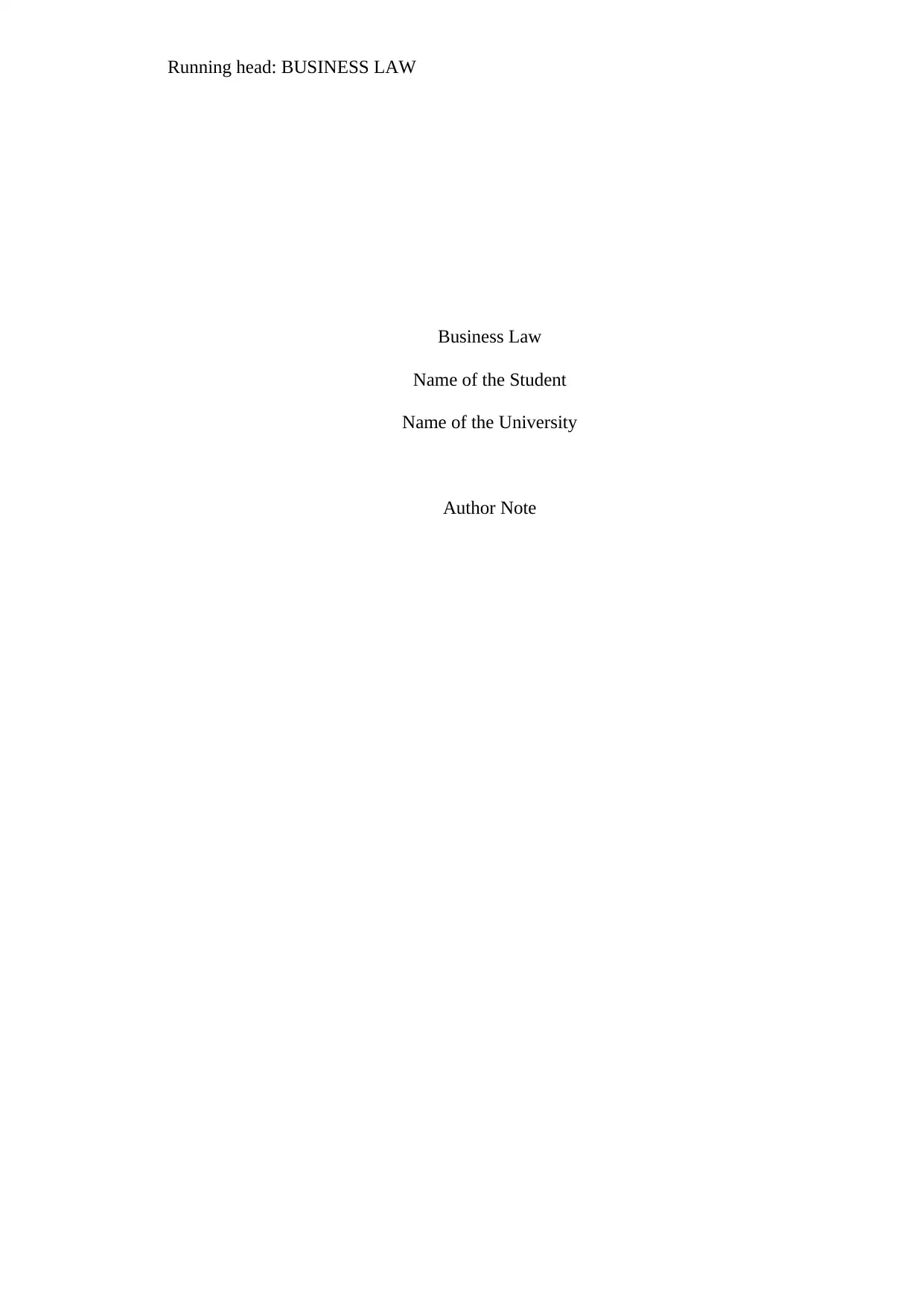
Running head: BUSINESS LAW
Business Law
Name of the Student
Name of the University
Author Note
Business Law
Name of the Student
Name of the University
Author Note
Paraphrase This Document
Need a fresh take? Get an instant paraphrase of this document with our AI Paraphraser
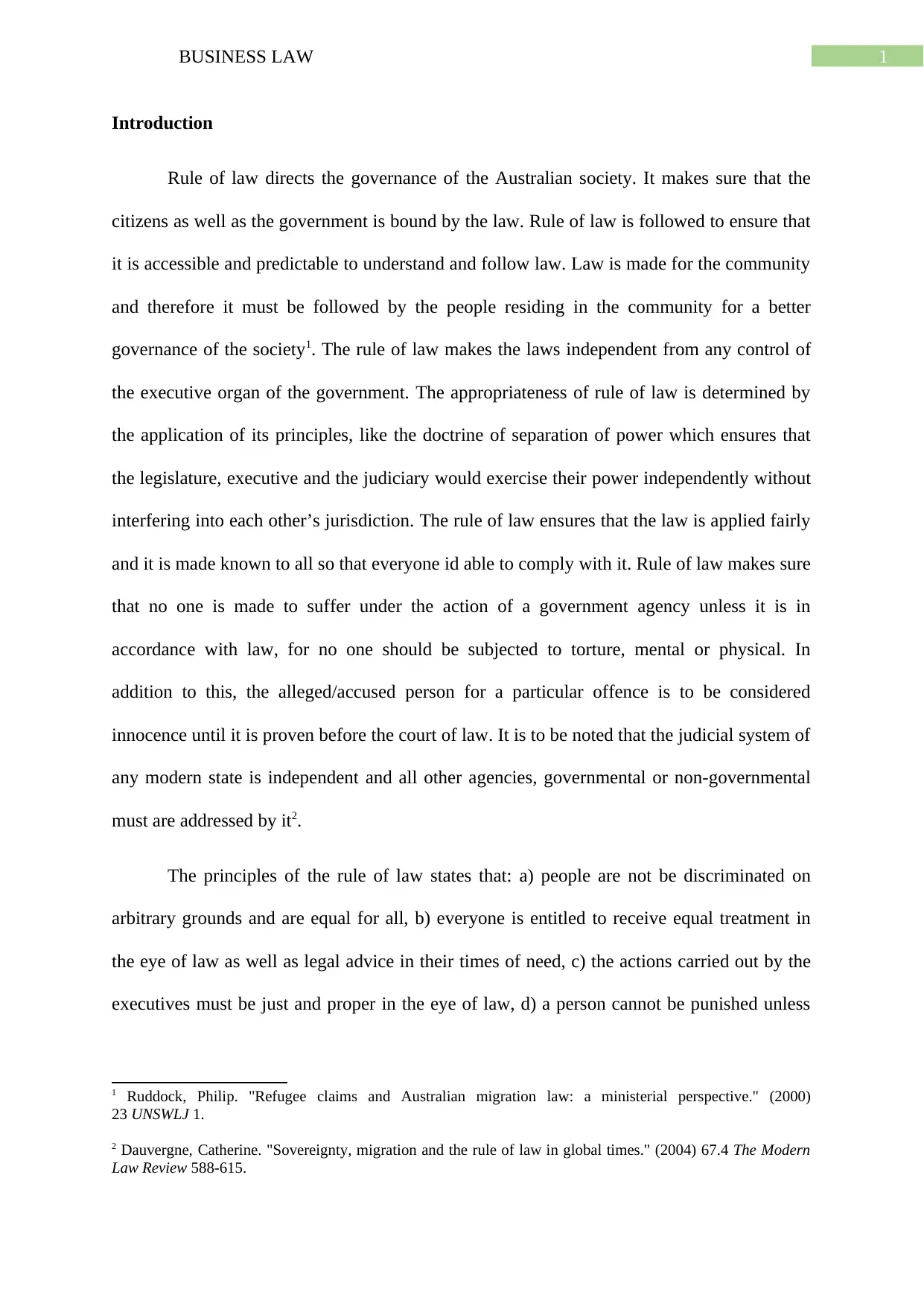
1BUSINESS LAW
Introduction
Rule of law directs the governance of the Australian society. It makes sure that the
citizens as well as the government is bound by the law. Rule of law is followed to ensure that
it is accessible and predictable to understand and follow law. Law is made for the community
and therefore it must be followed by the people residing in the community for a better
governance of the society1. The rule of law makes the laws independent from any control of
the executive organ of the government. The appropriateness of rule of law is determined by
the application of its principles, like the doctrine of separation of power which ensures that
the legislature, executive and the judiciary would exercise their power independently without
interfering into each other’s jurisdiction. The rule of law ensures that the law is applied fairly
and it is made known to all so that everyone id able to comply with it. Rule of law makes sure
that no one is made to suffer under the action of a government agency unless it is in
accordance with law, for no one should be subjected to torture, mental or physical. In
addition to this, the alleged/accused person for a particular offence is to be considered
innocence until it is proven before the court of law. It is to be noted that the judicial system of
any modern state is independent and all other agencies, governmental or non-governmental
must are addressed by it2.
The principles of the rule of law states that: a) people are not be discriminated on
arbitrary grounds and are equal for all, b) everyone is entitled to receive equal treatment in
the eye of law as well as legal advice in their times of need, c) the actions carried out by the
executives must be just and proper in the eye of law, d) a person cannot be punished unless
1 Ruddock, Philip. "Refugee claims and Australian migration law: a ministerial perspective." (2000)
23 UNSWLJ 1.
2 Dauvergne, Catherine. "Sovereignty, migration and the rule of law in global times." (2004) 67.4 The Modern
Law Review 588-615.
Introduction
Rule of law directs the governance of the Australian society. It makes sure that the
citizens as well as the government is bound by the law. Rule of law is followed to ensure that
it is accessible and predictable to understand and follow law. Law is made for the community
and therefore it must be followed by the people residing in the community for a better
governance of the society1. The rule of law makes the laws independent from any control of
the executive organ of the government. The appropriateness of rule of law is determined by
the application of its principles, like the doctrine of separation of power which ensures that
the legislature, executive and the judiciary would exercise their power independently without
interfering into each other’s jurisdiction. The rule of law ensures that the law is applied fairly
and it is made known to all so that everyone id able to comply with it. Rule of law makes sure
that no one is made to suffer under the action of a government agency unless it is in
accordance with law, for no one should be subjected to torture, mental or physical. In
addition to this, the alleged/accused person for a particular offence is to be considered
innocence until it is proven before the court of law. It is to be noted that the judicial system of
any modern state is independent and all other agencies, governmental or non-governmental
must are addressed by it2.
The principles of the rule of law states that: a) people are not be discriminated on
arbitrary grounds and are equal for all, b) everyone is entitled to receive equal treatment in
the eye of law as well as legal advice in their times of need, c) the actions carried out by the
executives must be just and proper in the eye of law, d) a person cannot be punished unless
1 Ruddock, Philip. "Refugee claims and Australian migration law: a ministerial perspective." (2000)
23 UNSWLJ 1.
2 Dauvergne, Catherine. "Sovereignty, migration and the rule of law in global times." (2004) 67.4 The Modern
Law Review 588-615.
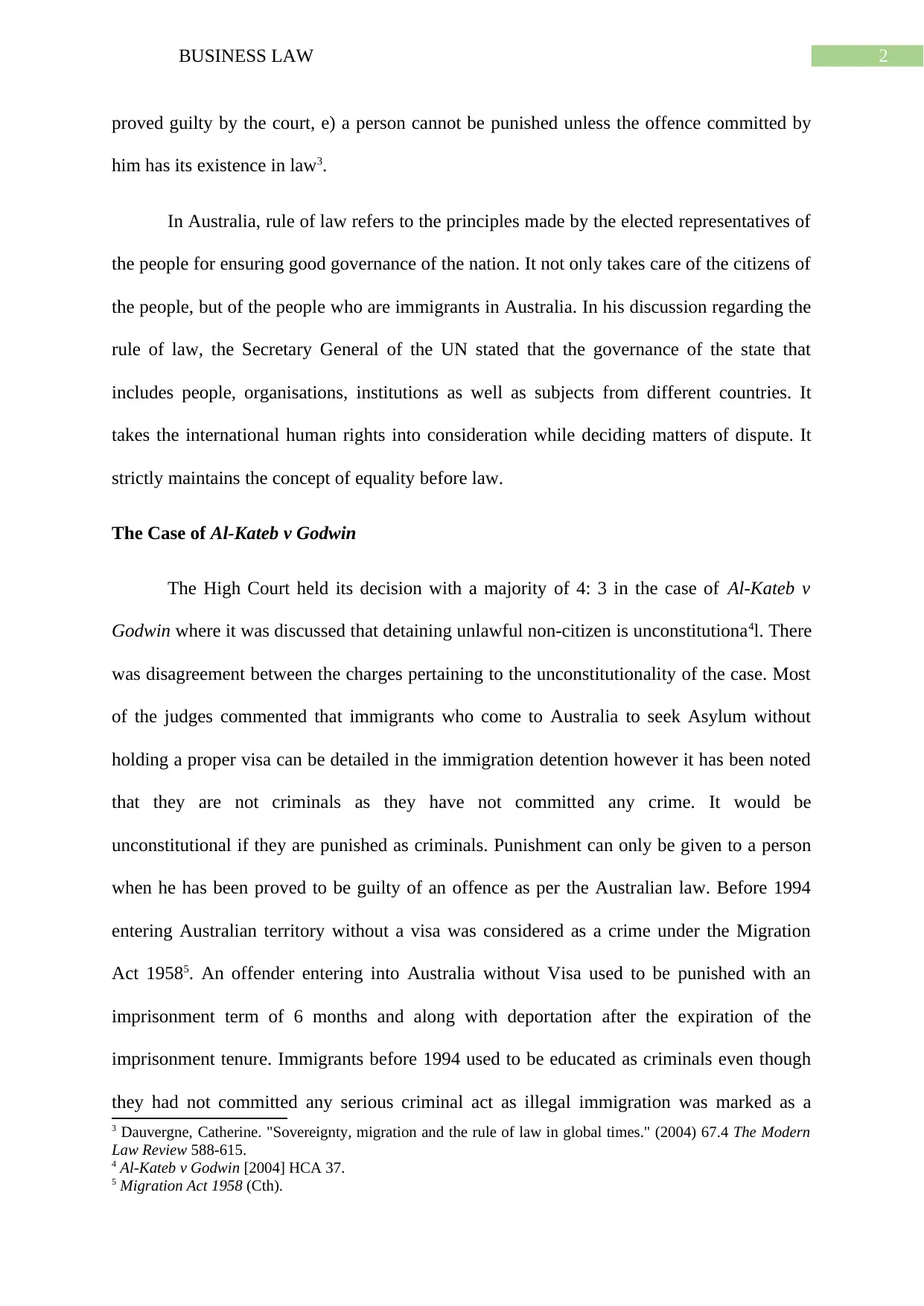
2BUSINESS LAW
proved guilty by the court, e) a person cannot be punished unless the offence committed by
him has its existence in law3.
In Australia, rule of law refers to the principles made by the elected representatives of
the people for ensuring good governance of the nation. It not only takes care of the citizens of
the people, but of the people who are immigrants in Australia. In his discussion regarding the
rule of law, the Secretary General of the UN stated that the governance of the state that
includes people, organisations, institutions as well as subjects from different countries. It
takes the international human rights into consideration while deciding matters of dispute. It
strictly maintains the concept of equality before law.
The Case of Al-Kateb v Godwin
The High Court held its decision with a majority of 4: 3 in the case of Al-Kateb v
Godwin where it was discussed that detaining unlawful non-citizen is unconstitutiona4l. There
was disagreement between the charges pertaining to the unconstitutionality of the case. Most
of the judges commented that immigrants who come to Australia to seek Asylum without
holding a proper visa can be detailed in the immigration detention however it has been noted
that they are not criminals as they have not committed any crime. It would be
unconstitutional if they are punished as criminals. Punishment can only be given to a person
when he has been proved to be guilty of an offence as per the Australian law. Before 1994
entering Australian territory without a visa was considered as a crime under the Migration
Act 19585. An offender entering into Australia without Visa used to be punished with an
imprisonment term of 6 months and along with deportation after the expiration of the
imprisonment tenure. Immigrants before 1994 used to be educated as criminals even though
they had not committed any serious criminal act as illegal immigration was marked as a
3 Dauvergne, Catherine. "Sovereignty, migration and the rule of law in global times." (2004) 67.4 The Modern
Law Review 588-615.
4 Al-Kateb v Godwin [2004] HCA 37.
5 Migration Act 1958 (Cth).
proved guilty by the court, e) a person cannot be punished unless the offence committed by
him has its existence in law3.
In Australia, rule of law refers to the principles made by the elected representatives of
the people for ensuring good governance of the nation. It not only takes care of the citizens of
the people, but of the people who are immigrants in Australia. In his discussion regarding the
rule of law, the Secretary General of the UN stated that the governance of the state that
includes people, organisations, institutions as well as subjects from different countries. It
takes the international human rights into consideration while deciding matters of dispute. It
strictly maintains the concept of equality before law.
The Case of Al-Kateb v Godwin
The High Court held its decision with a majority of 4: 3 in the case of Al-Kateb v
Godwin where it was discussed that detaining unlawful non-citizen is unconstitutiona4l. There
was disagreement between the charges pertaining to the unconstitutionality of the case. Most
of the judges commented that immigrants who come to Australia to seek Asylum without
holding a proper visa can be detailed in the immigration detention however it has been noted
that they are not criminals as they have not committed any crime. It would be
unconstitutional if they are punished as criminals. Punishment can only be given to a person
when he has been proved to be guilty of an offence as per the Australian law. Before 1994
entering Australian territory without a visa was considered as a crime under the Migration
Act 19585. An offender entering into Australia without Visa used to be punished with an
imprisonment term of 6 months and along with deportation after the expiration of the
imprisonment tenure. Immigrants before 1994 used to be educated as criminals even though
they had not committed any serious criminal act as illegal immigration was marked as a
3 Dauvergne, Catherine. "Sovereignty, migration and the rule of law in global times." (2004) 67.4 The Modern
Law Review 588-615.
4 Al-Kateb v Godwin [2004] HCA 37.
5 Migration Act 1958 (Cth).
⊘ This is a preview!⊘
Do you want full access?
Subscribe today to unlock all pages.

Trusted by 1+ million students worldwide
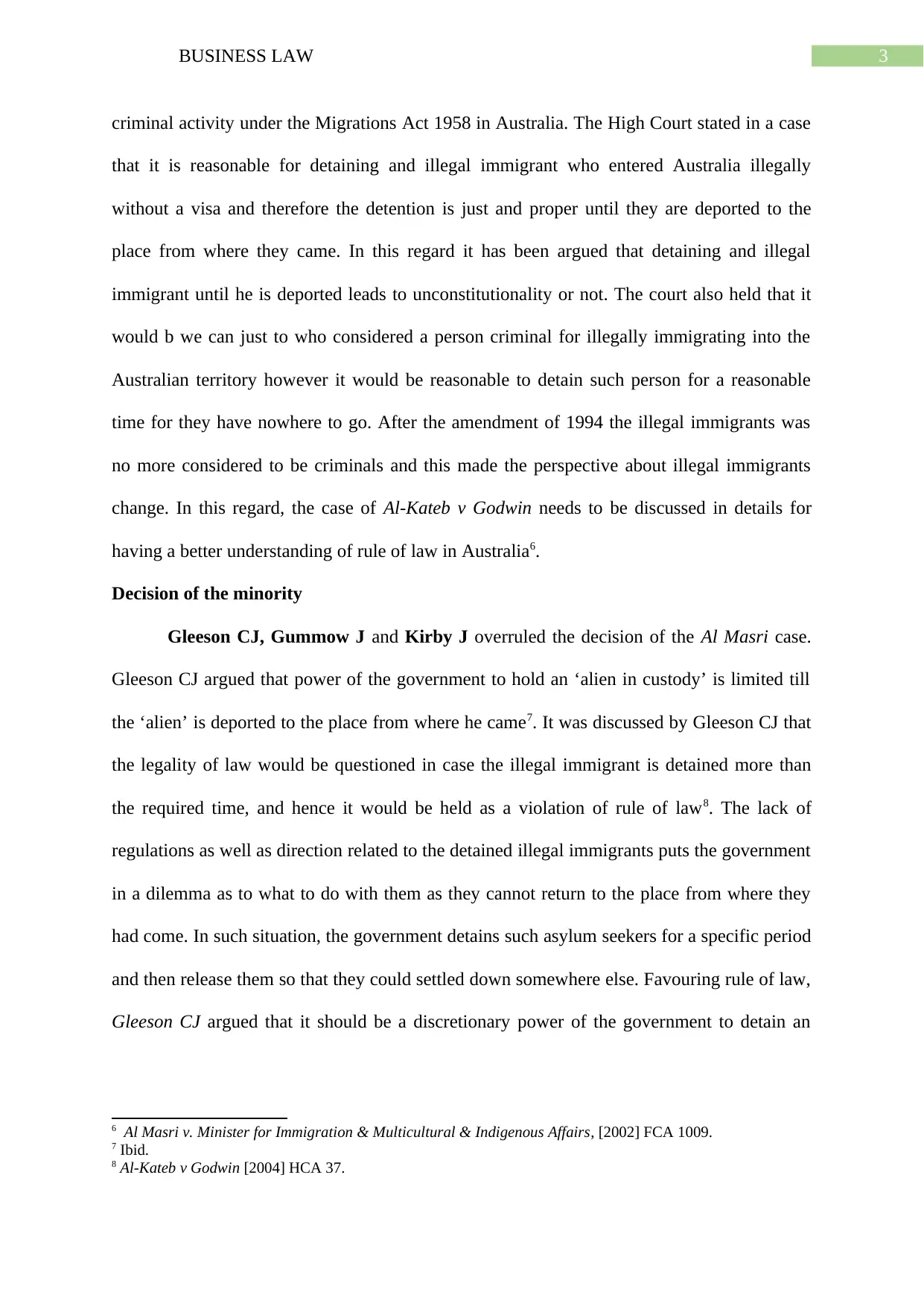
3BUSINESS LAW
criminal activity under the Migrations Act 1958 in Australia. The High Court stated in a case
that it is reasonable for detaining and illegal immigrant who entered Australia illegally
without a visa and therefore the detention is just and proper until they are deported to the
place from where they came. In this regard it has been argued that detaining and illegal
immigrant until he is deported leads to unconstitutionality or not. The court also held that it
would b we can just to who considered a person criminal for illegally immigrating into the
Australian territory however it would be reasonable to detain such person for a reasonable
time for they have nowhere to go. After the amendment of 1994 the illegal immigrants was
no more considered to be criminals and this made the perspective about illegal immigrants
change. In this regard, the case of Al-Kateb v Godwin needs to be discussed in details for
having a better understanding of rule of law in Australia6.
Decision of the minority
Gleeson CJ, Gummow J and Kirby J overruled the decision of the Al Masri case.
Gleeson CJ argued that power of the government to hold an ‘alien in custody’ is limited till
the ‘alien’ is deported to the place from where he came7. It was discussed by Gleeson CJ that
the legality of law would be questioned in case the illegal immigrant is detained more than
the required time, and hence it would be held as a violation of rule of law8. The lack of
regulations as well as direction related to the detained illegal immigrants puts the government
in a dilemma as to what to do with them as they cannot return to the place from where they
had come. In such situation, the government detains such asylum seekers for a specific period
and then release them so that they could settled down somewhere else. Favouring rule of law,
Gleeson CJ argued that it should be a discretionary power of the government to detain an
6 Al Masri v. Minister for Immigration & Multicultural & Indigenous Affairs, [2002] FCA 1009.
7 Ibid.
8 Al-Kateb v Godwin [2004] HCA 37.
criminal activity under the Migrations Act 1958 in Australia. The High Court stated in a case
that it is reasonable for detaining and illegal immigrant who entered Australia illegally
without a visa and therefore the detention is just and proper until they are deported to the
place from where they came. In this regard it has been argued that detaining and illegal
immigrant until he is deported leads to unconstitutionality or not. The court also held that it
would b we can just to who considered a person criminal for illegally immigrating into the
Australian territory however it would be reasonable to detain such person for a reasonable
time for they have nowhere to go. After the amendment of 1994 the illegal immigrants was
no more considered to be criminals and this made the perspective about illegal immigrants
change. In this regard, the case of Al-Kateb v Godwin needs to be discussed in details for
having a better understanding of rule of law in Australia6.
Decision of the minority
Gleeson CJ, Gummow J and Kirby J overruled the decision of the Al Masri case.
Gleeson CJ argued that power of the government to hold an ‘alien in custody’ is limited till
the ‘alien’ is deported to the place from where he came7. It was discussed by Gleeson CJ that
the legality of law would be questioned in case the illegal immigrant is detained more than
the required time, and hence it would be held as a violation of rule of law8. The lack of
regulations as well as direction related to the detained illegal immigrants puts the government
in a dilemma as to what to do with them as they cannot return to the place from where they
had come. In such situation, the government detains such asylum seekers for a specific period
and then release them so that they could settled down somewhere else. Favouring rule of law,
Gleeson CJ argued that it should be a discretionary power of the government to detain an
6 Al Masri v. Minister for Immigration & Multicultural & Indigenous Affairs, [2002] FCA 1009.
7 Ibid.
8 Al-Kateb v Godwin [2004] HCA 37.
Paraphrase This Document
Need a fresh take? Get an instant paraphrase of this document with our AI Paraphraser
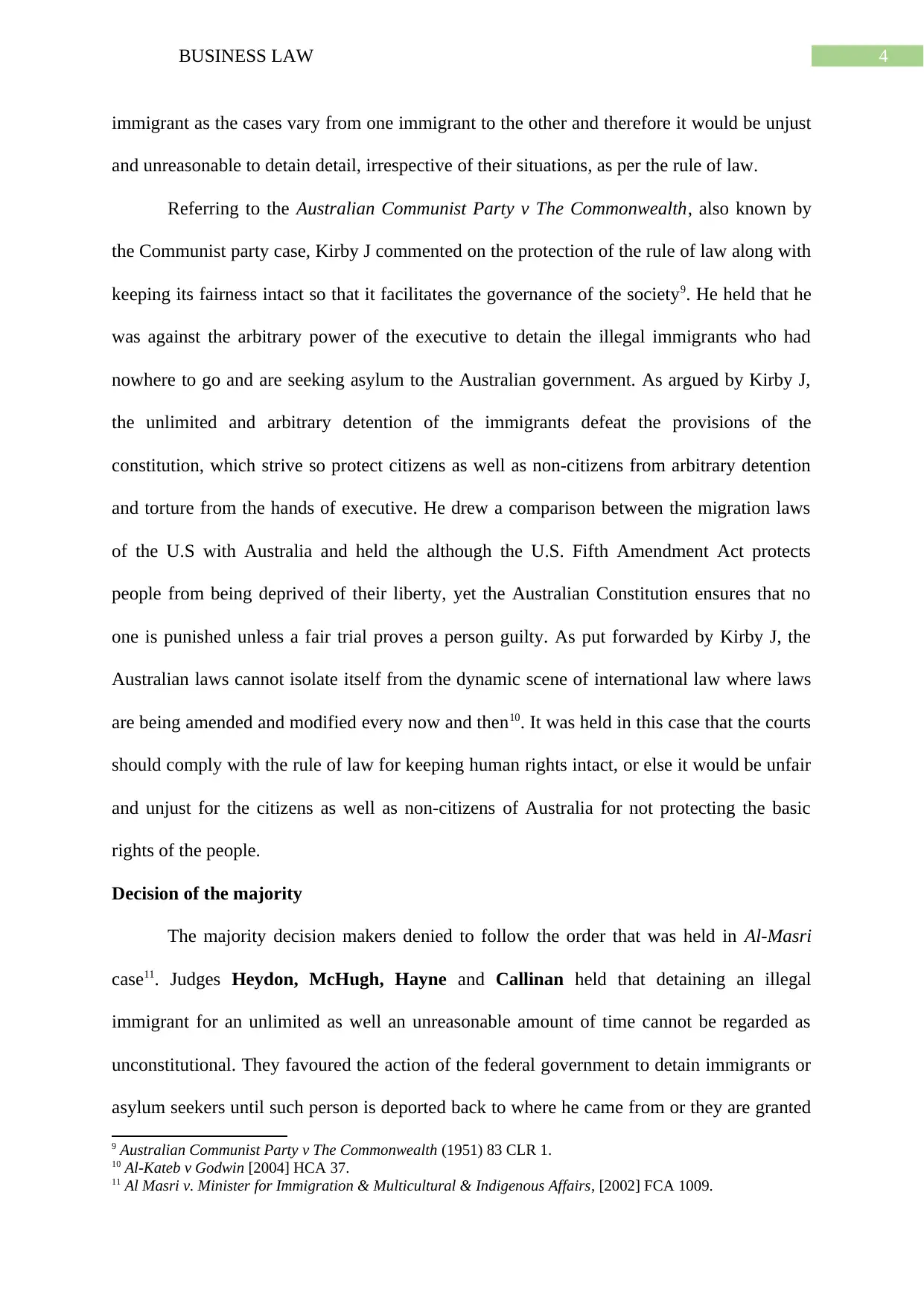
4BUSINESS LAW
immigrant as the cases vary from one immigrant to the other and therefore it would be unjust
and unreasonable to detain detail, irrespective of their situations, as per the rule of law.
Referring to the Australian Communist Party v The Commonwealth, also known by
the Communist party case, Kirby J commented on the protection of the rule of law along with
keeping its fairness intact so that it facilitates the governance of the society9. He held that he
was against the arbitrary power of the executive to detain the illegal immigrants who had
nowhere to go and are seeking asylum to the Australian government. As argued by Kirby J,
the unlimited and arbitrary detention of the immigrants defeat the provisions of the
constitution, which strive so protect citizens as well as non-citizens from arbitrary detention
and torture from the hands of executive. He drew a comparison between the migration laws
of the U.S with Australia and held the although the U.S. Fifth Amendment Act protects
people from being deprived of their liberty, yet the Australian Constitution ensures that no
one is punished unless a fair trial proves a person guilty. As put forwarded by Kirby J, the
Australian laws cannot isolate itself from the dynamic scene of international law where laws
are being amended and modified every now and then10. It was held in this case that the courts
should comply with the rule of law for keeping human rights intact, or else it would be unfair
and unjust for the citizens as well as non-citizens of Australia for not protecting the basic
rights of the people.
Decision of the majority
The majority decision makers denied to follow the order that was held in Al-Masri
case11. Judges Heydon, McHugh, Hayne and Callinan held that detaining an illegal
immigrant for an unlimited as well an unreasonable amount of time cannot be regarded as
unconstitutional. They favoured the action of the federal government to detain immigrants or
asylum seekers until such person is deported back to where he came from or they are granted
9 Australian Communist Party v The Commonwealth (1951) 83 CLR 1.
10 Al-Kateb v Godwin [2004] HCA 37.
11 Al Masri v. Minister for Immigration & Multicultural & Indigenous Affairs, [2002] FCA 1009.
immigrant as the cases vary from one immigrant to the other and therefore it would be unjust
and unreasonable to detain detail, irrespective of their situations, as per the rule of law.
Referring to the Australian Communist Party v The Commonwealth, also known by
the Communist party case, Kirby J commented on the protection of the rule of law along with
keeping its fairness intact so that it facilitates the governance of the society9. He held that he
was against the arbitrary power of the executive to detain the illegal immigrants who had
nowhere to go and are seeking asylum to the Australian government. As argued by Kirby J,
the unlimited and arbitrary detention of the immigrants defeat the provisions of the
constitution, which strive so protect citizens as well as non-citizens from arbitrary detention
and torture from the hands of executive. He drew a comparison between the migration laws
of the U.S with Australia and held the although the U.S. Fifth Amendment Act protects
people from being deprived of their liberty, yet the Australian Constitution ensures that no
one is punished unless a fair trial proves a person guilty. As put forwarded by Kirby J, the
Australian laws cannot isolate itself from the dynamic scene of international law where laws
are being amended and modified every now and then10. It was held in this case that the courts
should comply with the rule of law for keeping human rights intact, or else it would be unfair
and unjust for the citizens as well as non-citizens of Australia for not protecting the basic
rights of the people.
Decision of the majority
The majority decision makers denied to follow the order that was held in Al-Masri
case11. Judges Heydon, McHugh, Hayne and Callinan held that detaining an illegal
immigrant for an unlimited as well an unreasonable amount of time cannot be regarded as
unconstitutional. They favoured the action of the federal government to detain immigrants or
asylum seekers until such person is deported back to where he came from or they are granted
9 Australian Communist Party v The Commonwealth (1951) 83 CLR 1.
10 Al-Kateb v Godwin [2004] HCA 37.
11 Al Masri v. Minister for Immigration & Multicultural & Indigenous Affairs, [2002] FCA 1009.
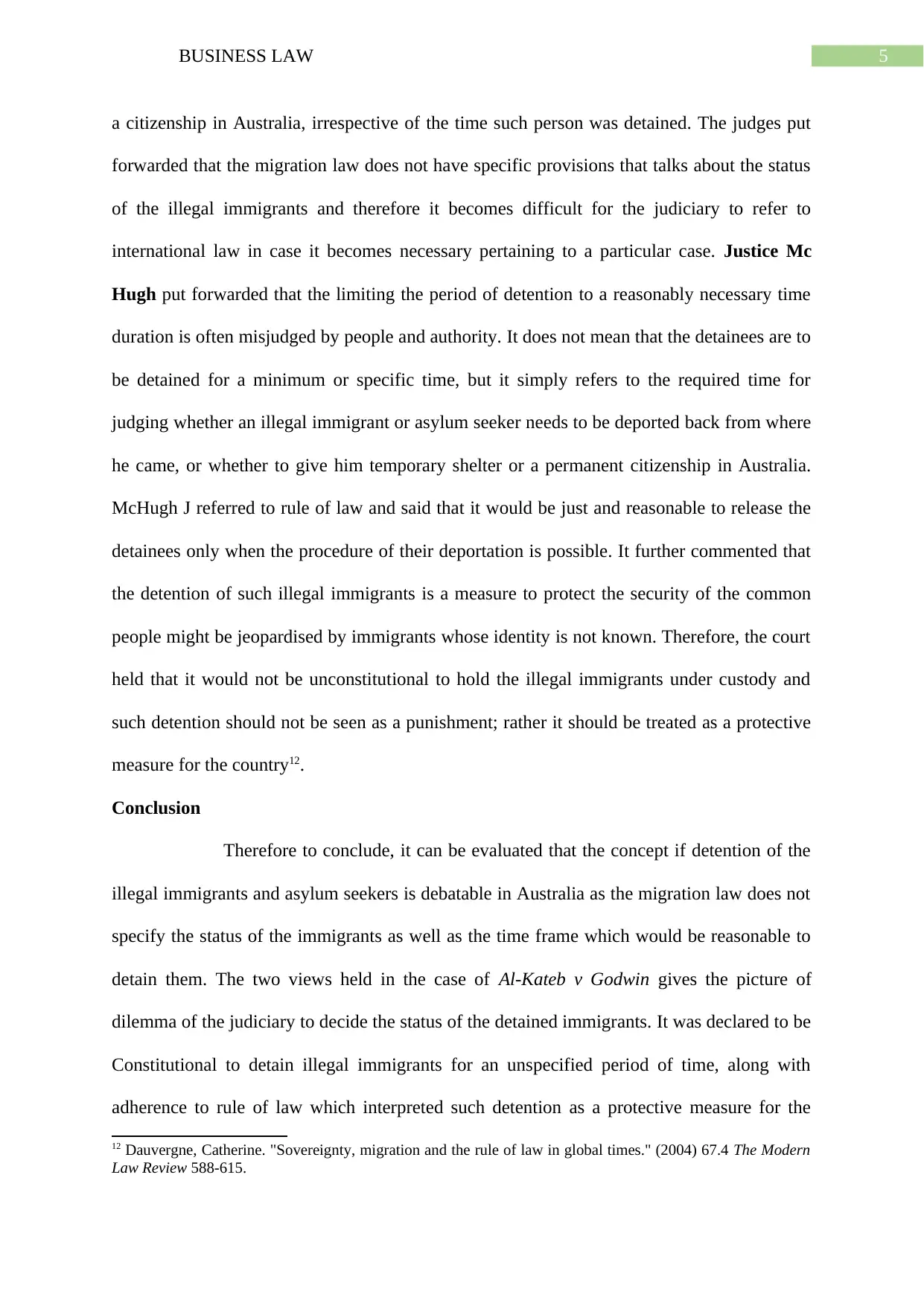
5BUSINESS LAW
a citizenship in Australia, irrespective of the time such person was detained. The judges put
forwarded that the migration law does not have specific provisions that talks about the status
of the illegal immigrants and therefore it becomes difficult for the judiciary to refer to
international law in case it becomes necessary pertaining to a particular case. Justice Mc
Hugh put forwarded that the limiting the period of detention to a reasonably necessary time
duration is often misjudged by people and authority. It does not mean that the detainees are to
be detained for a minimum or specific time, but it simply refers to the required time for
judging whether an illegal immigrant or asylum seeker needs to be deported back from where
he came, or whether to give him temporary shelter or a permanent citizenship in Australia.
McHugh J referred to rule of law and said that it would be just and reasonable to release the
detainees only when the procedure of their deportation is possible. It further commented that
the detention of such illegal immigrants is a measure to protect the security of the common
people might be jeopardised by immigrants whose identity is not known. Therefore, the court
held that it would not be unconstitutional to hold the illegal immigrants under custody and
such detention should not be seen as a punishment; rather it should be treated as a protective
measure for the country12.
Conclusion
Therefore to conclude, it can be evaluated that the concept if detention of the
illegal immigrants and asylum seekers is debatable in Australia as the migration law does not
specify the status of the immigrants as well as the time frame which would be reasonable to
detain them. The two views held in the case of Al-Kateb v Godwin gives the picture of
dilemma of the judiciary to decide the status of the detained immigrants. It was declared to be
Constitutional to detain illegal immigrants for an unspecified period of time, along with
adherence to rule of law which interpreted such detention as a protective measure for the
12 Dauvergne, Catherine. "Sovereignty, migration and the rule of law in global times." (2004) 67.4 The Modern
Law Review 588-615.
a citizenship in Australia, irrespective of the time such person was detained. The judges put
forwarded that the migration law does not have specific provisions that talks about the status
of the illegal immigrants and therefore it becomes difficult for the judiciary to refer to
international law in case it becomes necessary pertaining to a particular case. Justice Mc
Hugh put forwarded that the limiting the period of detention to a reasonably necessary time
duration is often misjudged by people and authority. It does not mean that the detainees are to
be detained for a minimum or specific time, but it simply refers to the required time for
judging whether an illegal immigrant or asylum seeker needs to be deported back from where
he came, or whether to give him temporary shelter or a permanent citizenship in Australia.
McHugh J referred to rule of law and said that it would be just and reasonable to release the
detainees only when the procedure of their deportation is possible. It further commented that
the detention of such illegal immigrants is a measure to protect the security of the common
people might be jeopardised by immigrants whose identity is not known. Therefore, the court
held that it would not be unconstitutional to hold the illegal immigrants under custody and
such detention should not be seen as a punishment; rather it should be treated as a protective
measure for the country12.
Conclusion
Therefore to conclude, it can be evaluated that the concept if detention of the
illegal immigrants and asylum seekers is debatable in Australia as the migration law does not
specify the status of the immigrants as well as the time frame which would be reasonable to
detain them. The two views held in the case of Al-Kateb v Godwin gives the picture of
dilemma of the judiciary to decide the status of the detained immigrants. It was declared to be
Constitutional to detain illegal immigrants for an unspecified period of time, along with
adherence to rule of law which interpreted such detention as a protective measure for the
12 Dauvergne, Catherine. "Sovereignty, migration and the rule of law in global times." (2004) 67.4 The Modern
Law Review 588-615.
⊘ This is a preview!⊘
Do you want full access?
Subscribe today to unlock all pages.

Trusted by 1+ million students worldwide
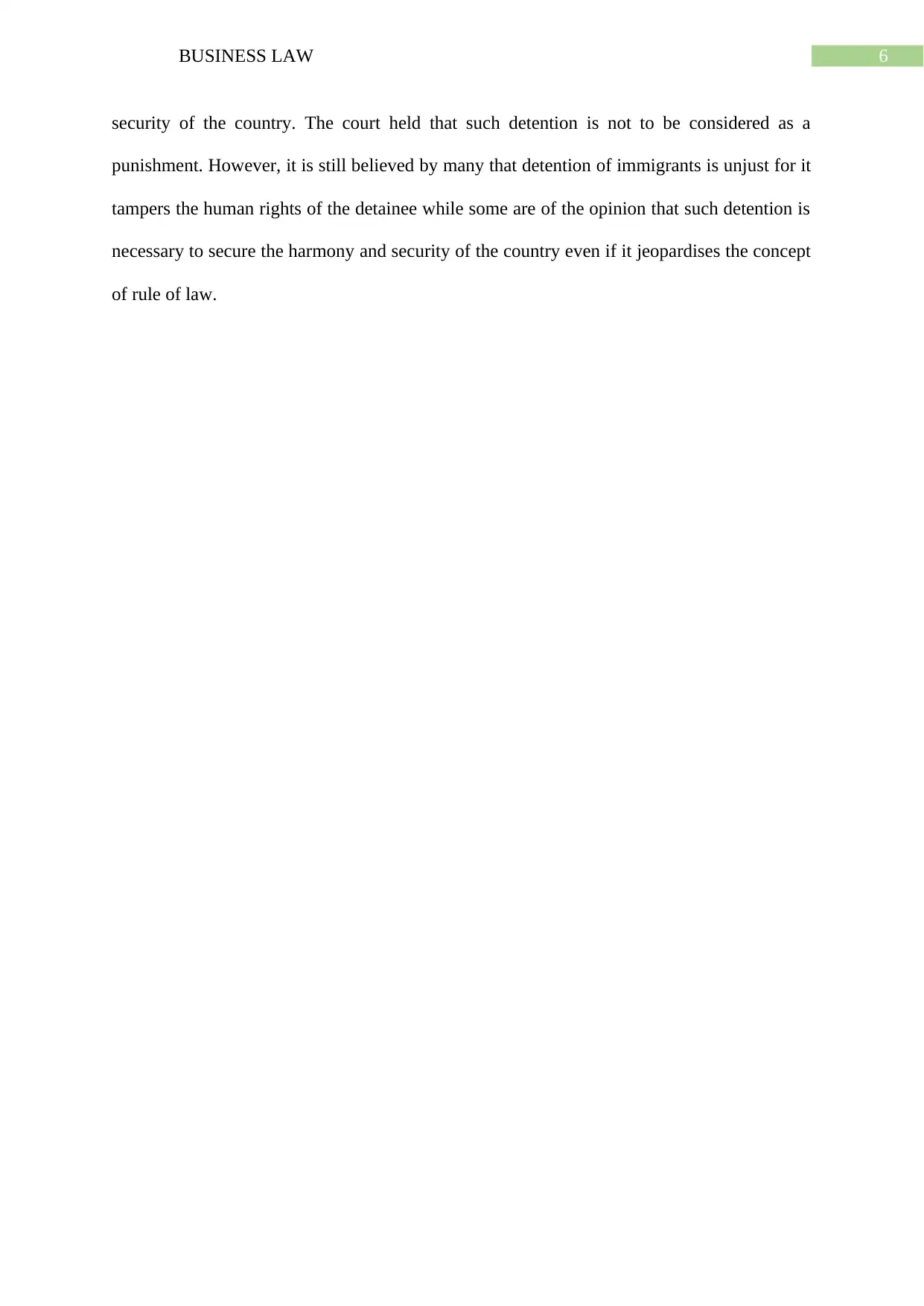
6BUSINESS LAW
security of the country. The court held that such detention is not to be considered as a
punishment. However, it is still believed by many that detention of immigrants is unjust for it
tampers the human rights of the detainee while some are of the opinion that such detention is
necessary to secure the harmony and security of the country even if it jeopardises the concept
of rule of law.
security of the country. The court held that such detention is not to be considered as a
punishment. However, it is still believed by many that detention of immigrants is unjust for it
tampers the human rights of the detainee while some are of the opinion that such detention is
necessary to secure the harmony and security of the country even if it jeopardises the concept
of rule of law.
Paraphrase This Document
Need a fresh take? Get an instant paraphrase of this document with our AI Paraphraser
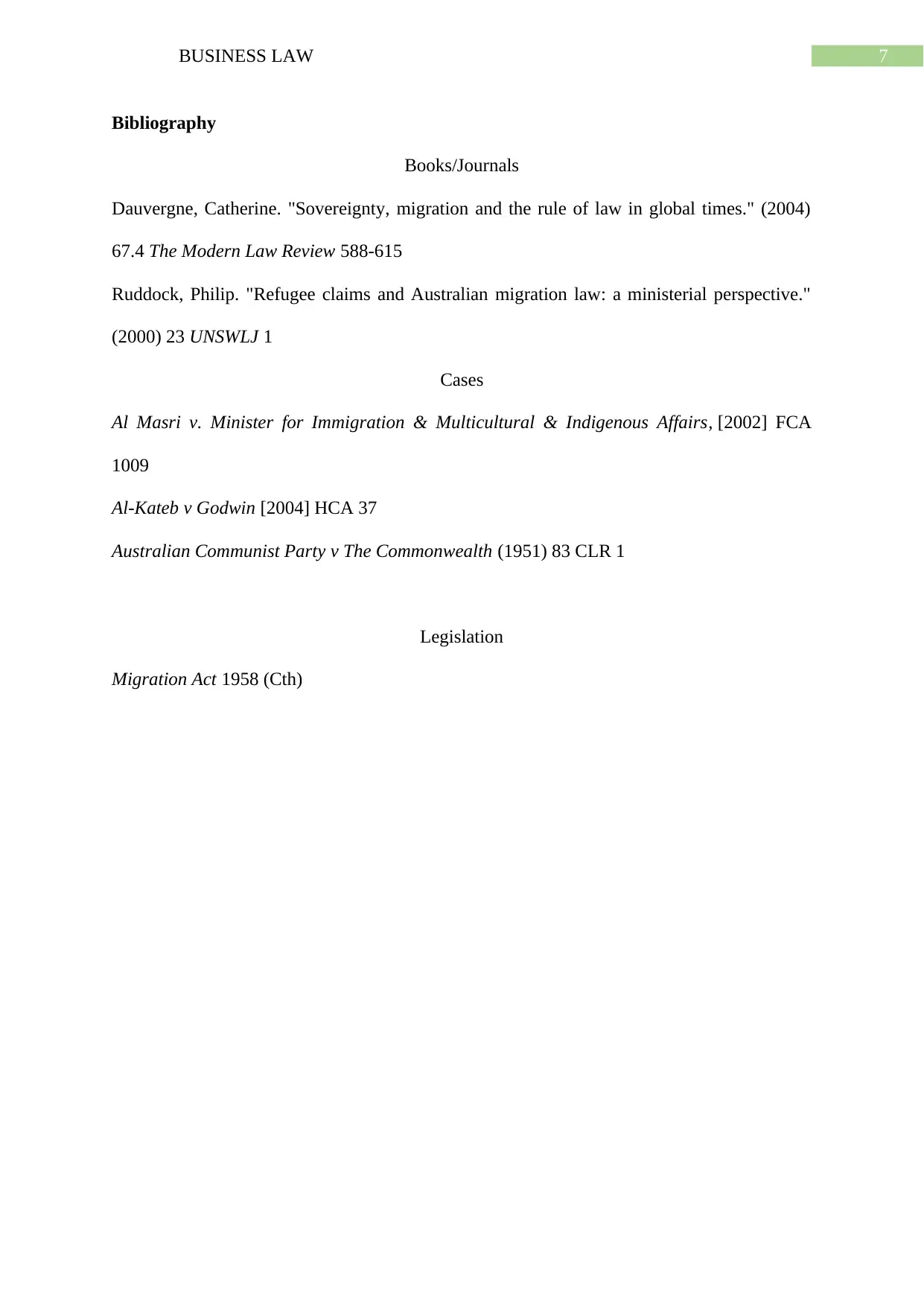
7BUSINESS LAW
Bibliography
Books/Journals
Dauvergne, Catherine. "Sovereignty, migration and the rule of law in global times." (2004)
67.4 The Modern Law Review 588-615
Ruddock, Philip. "Refugee claims and Australian migration law: a ministerial perspective."
(2000) 23 UNSWLJ 1
Cases
Al Masri v. Minister for Immigration & Multicultural & Indigenous Affairs, [2002] FCA
1009
Al-Kateb v Godwin [2004] HCA 37
Australian Communist Party v The Commonwealth (1951) 83 CLR 1
Legislation
Migration Act 1958 (Cth)
Bibliography
Books/Journals
Dauvergne, Catherine. "Sovereignty, migration and the rule of law in global times." (2004)
67.4 The Modern Law Review 588-615
Ruddock, Philip. "Refugee claims and Australian migration law: a ministerial perspective."
(2000) 23 UNSWLJ 1
Cases
Al Masri v. Minister for Immigration & Multicultural & Indigenous Affairs, [2002] FCA
1009
Al-Kateb v Godwin [2004] HCA 37
Australian Communist Party v The Commonwealth (1951) 83 CLR 1
Legislation
Migration Act 1958 (Cth)
1 out of 8
Related Documents
Your All-in-One AI-Powered Toolkit for Academic Success.
+13062052269
info@desklib.com
Available 24*7 on WhatsApp / Email
![[object Object]](/_next/static/media/star-bottom.7253800d.svg)
Unlock your academic potential
Copyright © 2020–2026 A2Z Services. All Rights Reserved. Developed and managed by ZUCOL.





